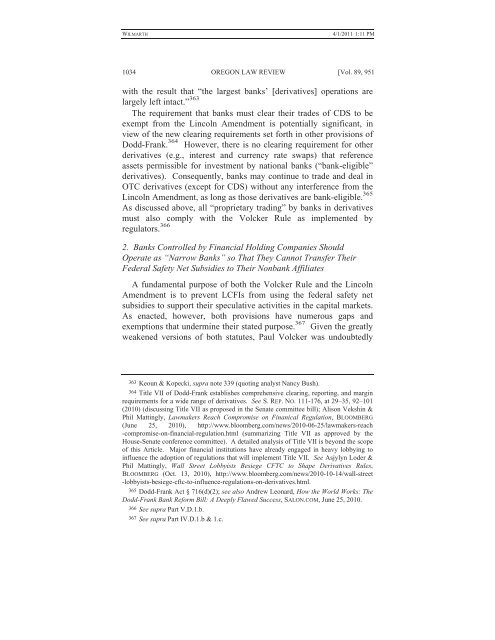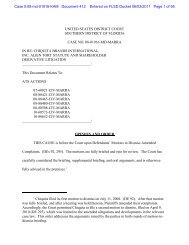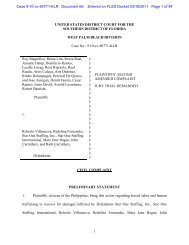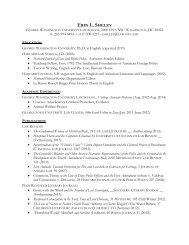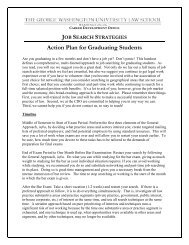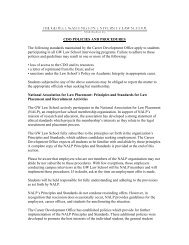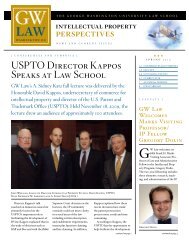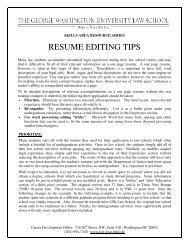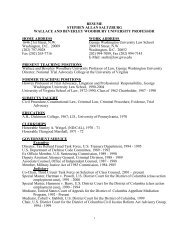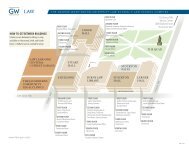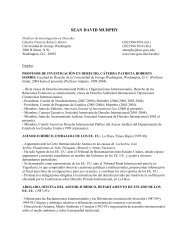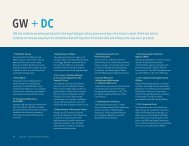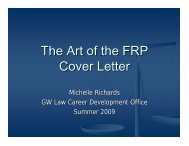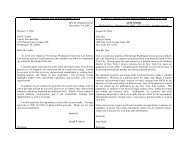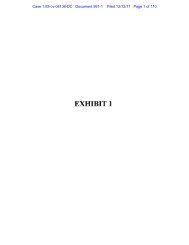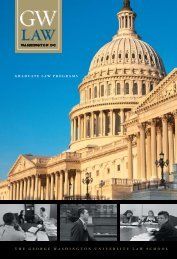CLE Materials for Panel #1 - George Washington University Law ...
CLE Materials for Panel #1 - George Washington University Law ...
CLE Materials for Panel #1 - George Washington University Law ...
Create successful ePaper yourself
Turn your PDF publications into a flip-book with our unique Google optimized e-Paper software.
WILMARTH<br />
4/1/2011 1:11 PM<br />
1034 OREGON LAW REVIEW [Vol. 89, 951<br />
with the result that “the largest banks’ [derivatives] operations are<br />
largely left intact.” 363<br />
The requirement that banks must clear their trades of CDS to be<br />
exempt from the Lincoln Amendment is potentially significant, in<br />
view of the new clearing requirements set <strong>for</strong>th in other provisions of<br />
Dodd-Frank. 364 However, there is no clearing requirement <strong>for</strong> other<br />
derivatives (e.g., interest and currency rate swaps) that reference<br />
assets permissible <strong>for</strong> investment by national banks (“bank-eligible”<br />
derivatives). Consequently, banks may continue to trade and deal in<br />
OTC derivatives (except <strong>for</strong> CDS) without any interference from the<br />
Lincoln Amendment, as long as those derivatives are bank-eligible. 365<br />
As discussed above, all “proprietary trading” by banks in derivatives<br />
must also comply with the Volcker Rule as implemented by<br />
regulators. 366<br />
2. Banks Controlled by Financial Holding Companies Should<br />
Operate as “Narrow Banks” so That They Cannot Transfer Their<br />
Federal Safety Net Subsidies to Their Nonbank Affiliates<br />
A fundamental purpose of both the Volcker Rule and the Lincoln<br />
Amendment is to prevent LCFIs from using the federal safety net<br />
subsidies to support their speculative activities in the capital markets.<br />
As enacted, however, both provisions have numerous gaps and<br />
exemptions that undermine their stated purpose. 367 Given the greatly<br />
weakened versions of both statutes, Paul Volcker was undoubtedly<br />
363 Keoun & Kopecki, supra note 339 (quoting analyst Nancy Bush).<br />
364 Title VII of Dodd-Frank establishes comprehensive clearing, reporting, and margin<br />
requirements <strong>for</strong> a wide range of derivatives. See S. REP.NO. 111-176, at 29–35, 92–101<br />
(2010) (discussing Title VII as proposed in the Senate committee bill); Alison Vekshin &<br />
Phil Mattingly, <strong>Law</strong>makers Reach Compromise on Finanical Regulation, BLOOMBERG<br />
(June 25, 2010), http://www.bloomberg.com/news/2010-06-25/lawmakers-reach<br />
-compromise-on-financial-regulation.html (summarizing Title VII as approved by the<br />
House-Senate conference committee). A detailed analysis of Title VII is beyond the scope<br />
of this Article. Major financial institutions have already engaged in heavy lobbying to<br />
influence the adoption of regulations that will implement Title VII. See Asjylyn Loder &<br />
Phil Mattingly, Wall Street Lobbyists Besiege CFTC to Shape Derivatives Rules,<br />
BLOOMBERG (Oct. 13, 2010), http://www.bloomberg.com/news/2010-10-14/wall-street<br />
-lobbyists-besiege-cftc-to-influence-regulations-on-derivatives.html.<br />
365 Dodd-Frank Act § 716(d)(2); see also Andrew Leonard, How the World Works: The<br />
Dodd-Frank Bank Re<strong>for</strong>m Bill: A Deeply Flawed Success, SALON.COM, June 25, 2010.<br />
366 See supra Part V.D.1.b.<br />
367 See supra Part IV.D.1.b & 1.c.


